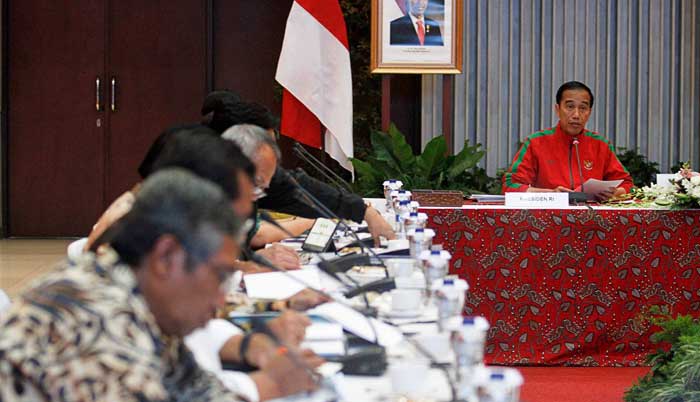![]() Home > Indonesia
Home > Indonesia
Indonesia Seeks To Plug $157 Billion Gap In Nation-Building Plan

President Joko "Jokowi" Widodo (center) leads a limited Cabinet meeting on the rehabilitation of Citarum River in Bandung, West Java, on Jan.16. (JP/Arya Dipa)
![]() January 27th, 2018 | 10:26 AM |
January 27th, 2018 | 10:26 AM | ![]() 1553 views
1553 views
INDONESIA
Indonesian President Joko Widodo is still chasing some $150 billion to fund his ambitious nation-building agenda, almost half-way into a five-year infrastructure plan.
The government has so far received pledges for just over half the funds needed to help develop the road, airport and railway projects planned in a $327 billion pipeline, latest government figures show. Just $15 billion has come from the state budget, with the bulk committed by private investors, including from China.
Widodo, known as Jokowi, needs outside money for his nation-building program after government revenues were battered by the end of the commodities boom and as tax compliance remains poor. With China making a massive push to build infrastructure and new trade routes across Asia through its Belt and Road Initiative, the world’s second-largest economy looms large as an obvious backer for Jokowi’s plans.
“In reality, there is only handful of countries with a surplus of money,” Rainier Haryanto, the program director of the Indonesian government’s Committee to Accelerate Priority Infrastructure, said in an interview in Jakarta. “The U.S., they are in debt. The Japanese, they are also in debt,” he said, but the Chinese have the money to lend. “At the end of the day, cash is king.”
As Southeast Asia’s biggest economy continues to struggle for revenue, the Jokowi government is leaning even more on the private sector. It’s estimated the state budget will only be able to fund about $25 billion of the projects that are yet to start, while Indonesia’s legions of state-owned companies -- numbering in the hundreds -- will account for some $48 billion. About $83.5 billion will have to be stumped up by the private sector.
Some urgency may be required. The World Bank says Indonesia has a $1.5 trillion infrastructure gap compared to other emerging economies. A lack of good roads and transport corridors across the archipelago -- a string of more than 17,000 islands that would stretch from New York to London -- are adding to logistical barriers and driving up costs for business.
Of Jokowi’s pipeline of 245 projects, just six have been completed since the program started in 2016 at a cost of $976 million, according to Haryanto. There are a further 145 under construction, documents show.
“They are making good progress and momentum is building, considering that they had a relatively slow start,” said Euben Paracuelles, senior economist for Southeast Asia at Nomura Holdings Inc. in Singapore. “The fact that there is a lower contribution from the government budget reflects the criteria that they used to identify these projects, including the viability for the private sector to participate."
Even with the financing secured, projects have to overcome red tape and regulatory burdens. The $6 billion Jakarta to Bandung high-speed rail, billed as a showpiece of Jokowi’s plans, starkly illustrates the challenge. The project has all but ground to a halt after becoming tangled in Indonesia’s infamous red tape. While construction was meant to begin in August 2016, only around half of the land needed for the 142-kilometer railway had been cleared as of September last year.
Indonesia’s regulatory framework, including a tricky permit process and day-to-day issues for investors that are "more to do with local governments" can often be a roadblock in the country’s development and growth, World Bank chief economist for Indonesia Frederico Gil Sander said in an interview.
"Improving the business environment has to be something that operates at all levels in order to ensure that there is more investment and there are more jobs created," he said.
Source:
courtesy of THE JAKARTA POST
by Karlis Salna
If you have any stories or news that you would like to share with the global online community, please feel free to share it with us by contacting us directly at [email protected]